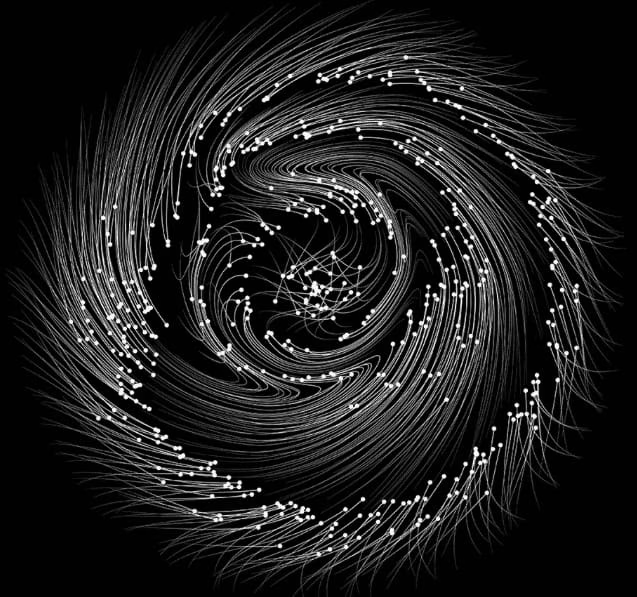Some Thoughts on Dataism

The final chapters of Homo Deus talks about the concept of Dataism. A cursory glance online doesn’t give too many previous reverences to the term, so I’m not sure if Yuval Noah Harari created the term himself, if he’s giving a different definition for a term already in use, or exactly what that situation is.
But let’s use his definition.
Dataism declares that the universe consists of data flows, and the value of any phenomenon or entity is determined by its contribution to data processing.
~ Harari, Yuval Noah (2017-02-21). Homo Deus: A Brief History of Tomorrow (p. 367). HarperCollins. Kindle Edition.
He describes a few core concepts in the same book, which I’ll capture and talk about here.
Dataism is an alternative to liberalism in that it does not place the human and their feelings and decisions at the center of the universe. Instead, it’s all about information flow.
The human species can be seen as a single data processing system, and the people are the chips in this computer metaphor.
Competing religions and political systems are simply competing information processing systems, on this view.
We improve the human system by: increasing the number of processors, increasing the variety of processors, increasing the connections between processors, or increasing the transfer of information between connections and processors.
The human processing system went through four main phases: the Cognitive Revolution, which put us all into a single data-processing network. The Agricultural Revolution, which continued until the invention of writing and money. The Writing & Money revolution. And the Scientific Revolution, which began around 1492.
He believes the ultimate output of this data processing is the creation of an Internet-of-All-Things, which will ultimately make Homo sapiens obsolete.
A primary commandment of Dataism is to maximize the flow of information by connecting to more of everything in order to create and consume more content. It also wants to link everything to itself, which is the bridge into the Internet of Things.
People subscribing to this are more likely to be young, and will be happy to give up their data to make this happen.
Proponents of this ideology believe that the system itself can know you better than you can know yourself, as it can with everyone. And ultimately we’ll rely on it more and more to make every decision, because it’ll do a better job.
The nature of AI algorithms makes it so that we won’t know how or what the system is doing, or how it’s so damn good at predicting and choosing things. It’ll become a black box, and it actually already is in many cases.
Humanism is all about experiences within us. Dataists say that anything that’s not shared is wasted, and that we cannot find meaning within us. Supposedly the solution is to send our experiences into the system and have it tell us what we should do next.
My analysis
First of all, I’m fascinated by this characterization. I’ve been reading, thinking, and writing about the topic for years now, but I’ve never seen the ideas crystalized in such a concise and powerful form before. My book didn’t focus on the personal responsibility aspects of the equation—just the technologies and how we will use them.
So I’m quite impressed, but I have some comments.
First of all, I don’t think the worlds of Humanism and Dataism will have strong borders between them in practical realty. At least not for the decades during transitions.
What we end up with is just people, and those people have some combination of many philosophies working simultaneously. As I say often, people are actually multiple people. So they’re likely to be both fiercely intent on their own experiences and willing to share them and get recommendations from an all-knowing AI—all within the same afternoon.
I also feel like the description of a data-focused world should have some mention of mechanisms for self-improvement. He mentions the number of nodes, and the connections between them, but I think we need some combination of ML and EA as well. I wrote about it in my chapter titled Getting Better at Getting Better.
It’s difficult to overstate the benefits that can come from being able to accelerate not just our ability to learn, but our ability to learn how to learn. That’s precisely what the combination of machine learning and evolutionary algorithms can do—both on their own and when used together to enhance each other.
~ Miessler, Daniel (2017-01-01). The Real Internet of Things (Kindle Locations 489-491). Kindle Edition.
I also found the concept of the Internet of All Things to be quite fascinating, for obvious reasons. He seems to be talking about what I believe to be the end-state for humans, and ultimately the transition into another form. Which he also talks about.
I think it’s also how we become immortal, since at that point we’d really just be digital brains. Ultimately even the concept of identity will seem strange, since our experiences will be so shared, and at such a fundamental level. Plus it will be trivial to copy and destroy versions of ourselves.
Anyway, it was great fun to read his Dataism characterization, and I look forward to exploring it more in the future.
Notes
As I have said multiple places already, you absolutely need to read Homo Deus. It’s absolutely spectacular.
This is the first time I’ve ever quoted myself in a bibliography sense. It was actually just a copy and paste from the Kindle app, which brings all that content with it by default (to protect authors). Either way, seeing my name combined with my book in this way produced a legitimate sensation of accomplishment.